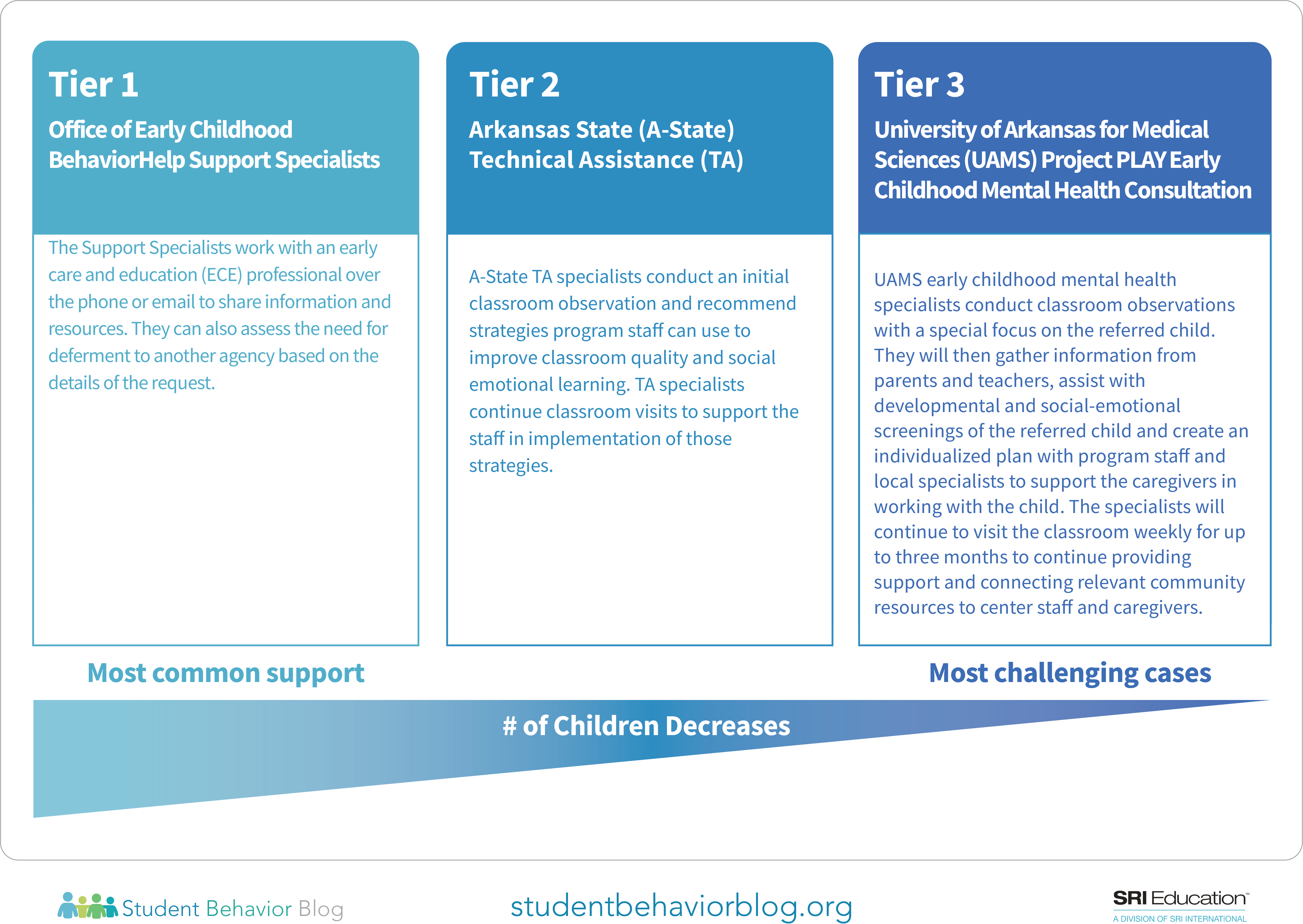Teaching preschool is simultaneously joyous and challenging. Students differ widely in their temperaments and their experience sharing space and resources with peers. Although many children adapt quickly to a group care environment, for others it can be challenging. Some early educators can access related professional development or external specialists that can help them better support children with challenging behavior. However, many cannot, and this can force teachers to consider a difficult choice: for the well-being of the rest of my class, should I remove a student? This can take the form of asking a child to be picked up early, suspending a child from the program for a short period of time, or asking that the child be removed from the program permanently.
Unfortunately, this practice is quite common. In fact, suspension or expulsion in early childhood settings occurs three times as often as in K-12 settings and more often affects black children. A growing body of research indicates exclusionary discipline practices such as temporarily or permanently removing a child from class are not developmentally appropriate for preschool-aged children and can have lasting negative effects for the child. For more information, see the post, Preventing expulsions in early childhood and supporting all children’s success.
To address this issue, the United States Departments of Health and Human Services and Education released official guidance in 2014 encouraging the use of federal funds to reduce exclusionary practices in early childhood settings. This prompted many states to shift their own initiatives to support this work and Arkansas was one of the first states to address this problem. Arkansas Department of Human Services staff made policy changes and provided a system of support to early care and education providers and continues to be a leader in this field.
Arkansas’ progressive approach to supporting young children
In 2015, the Arkansas Department of Human Services released a simple, yet effective exclusionary discipline policy: “No child shall be dismissed from the program for behavior without prior approval from the Arkansas Department of Human Services/Division of Child Care and Early Childhood Education (DCCECE).” However, they recognized that it was equally important to invest in preventative programs and subsequently launched BehaviorHelp, a collaborative and streamlined system to connect early care and education providers with resources to better support children with challenging behavior.
To access these resources, an interested child care provider must fill out a short online request form, opening a case within the DCCECE. Case managers can then match a provider’s request with the proper type of support according to the severity of the case:
Three-Tiered BehaviorHelp System

At the time of this policy’s enactment, Arkansas had some existing programs and staff to support this work, but there was not a clear way for them to collaborate. Dr. Nikki Edge, a professor of family and preventative medicine at the University of Arkansas for Medical Sciences (UAMS) and director of Project PLAY, emphasizes the effectiveness of the tiered approach. BehaviorHelp is meant to serve as a single point-of-entry for child care providers, directors, child welfare caseworkers, and parents to access supports for children with challenging behavior in the classroom and connect all relevant players.
And Arkansas has seen huge successes. Of the 1143 cases the BehaviorHelp team closed in both 2018 and 2019, only 34 (3%) children were expelled. As a sign of their success, participation in BehaviorHelp is growing; Dr. Edge reported a 40% increase in participation each year since the system’s launch in 2016 and high levels of teacher satisfaction. BehaviorHelp services have also been shown to improve student well-being. Last year, teachers participating in three-month Project PLAY early childhood mental health consultations saw a significant decrease in challenging and hyperactive behavior of the referred student and a significant increase in prosocial behaviors.
Dr. Edge stresses that the success of this type of work depends on strong leadership, partnerships, and enthusiasm for helping children and providers. She says that other states might learn from the simplicity of Arkansas’ policy, willingness to shift to a new system, and focus on collaboration. Every state has people and programs that are passionate about early care and education that have the skills to support this type of work; the tricky part is finding a systematic way to foster meaningful collaboration.
Overcoming challenges: Reaching out and serving all children
However, there are still many providers across the state that do not take advantage of the BehaviorHelp system, many of which have been identified by the DCCECE as programs that are most in need of assistance. Among these are Child Care and Development Fund (CCDF)-funded programs, which receive child care subsidies through a federal block grant. Recent surveys of child care providers in Maine, Virginia, and New Mexico found that CCDF-funded child care program settings, compared with Head Start and PreK-K, had the highest rates of provider-reported removal of children due to challenging behavior.
To learn more about what factors may limit or enhance the potential success of Arkansas’ exclusionary discipline policies and available social-emotional supports in CCDF-funded programs specifically, the DCCECE has partnered with SRI and the National Center for Children in Poverty (NCCP) as part of the Child Care Policy Research Partnership Grant. This study aims to learn more about CCDF providers’ awareness of Arkansas’ expulsion and suspension prevention policy, their connection to support programs, and their access to high quality, social-emotional-focused professional development, and early childhood mental health consultation.
Arkansas’ dedication to this work is fueled by faith in child care providers. They recognize that with access to the right trainings and resources, teachers might not even consider suspending or removing a child from their program. Instead, our original question might look like this: for the well-being of all of my students, what do I need to best support this child?
Topics: Early childhood Mental health Social-emotional learning
